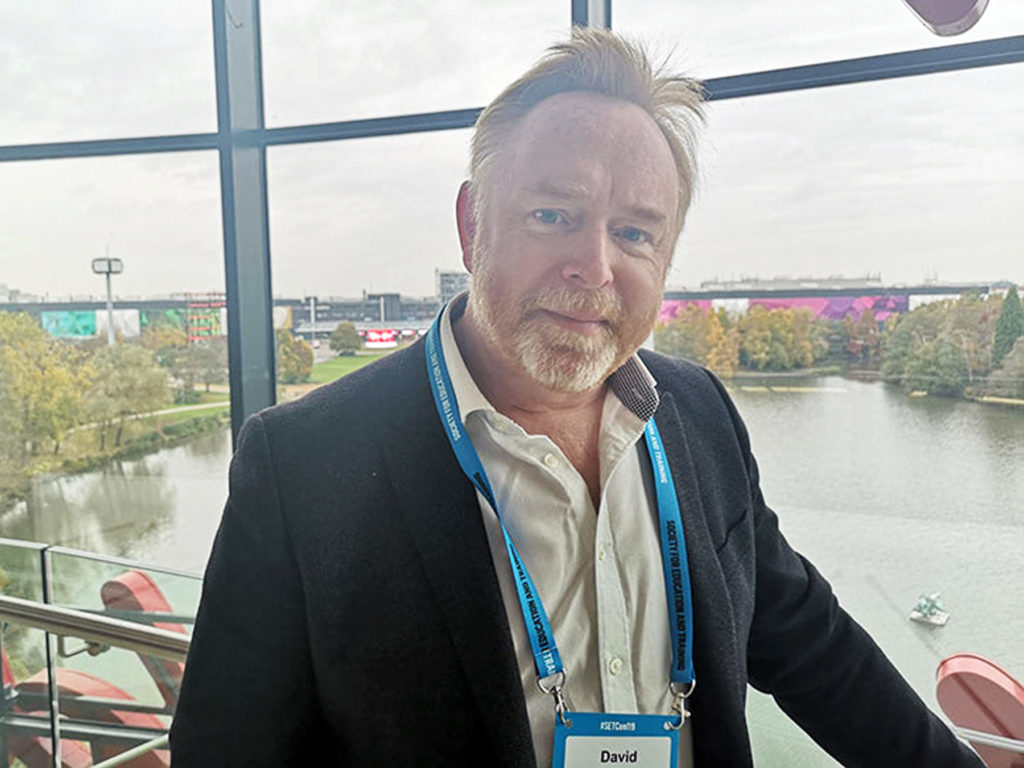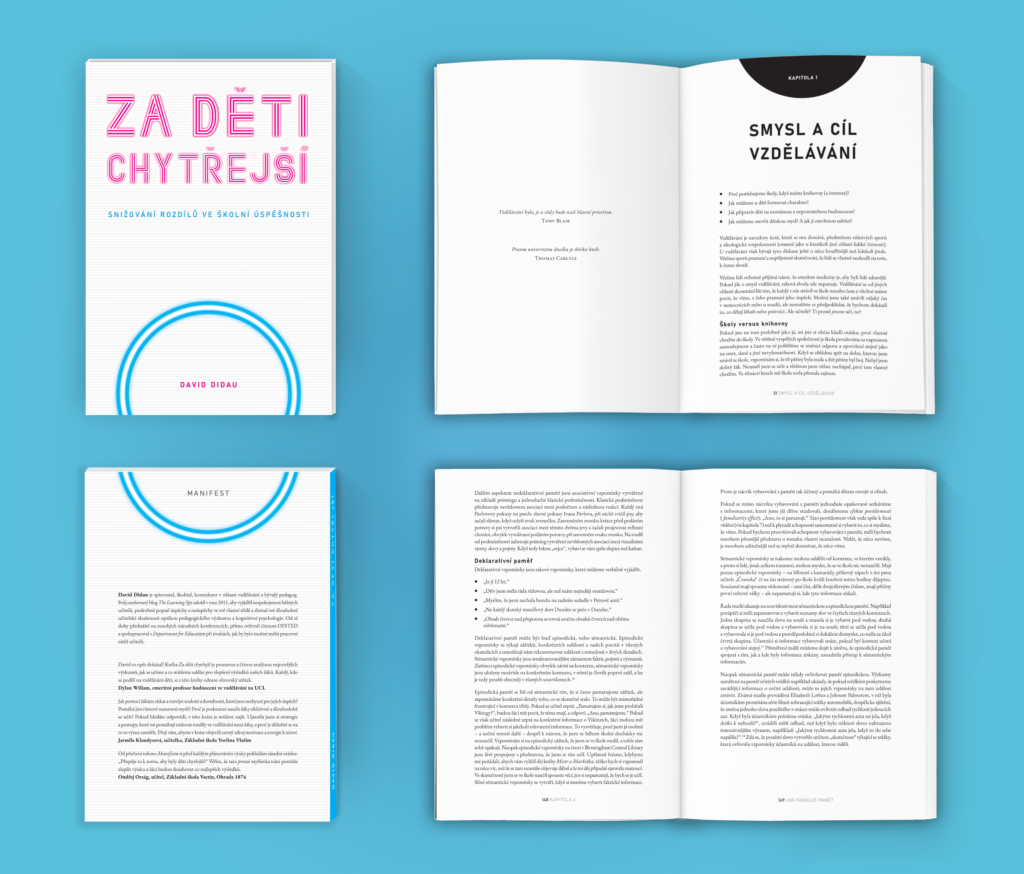Let’s make kids cleverer. They will be more likely to live a fulfilled life, says David Didau
How are children influenced by the topics spoken about at the dinner table? Should children be grouped based on ability? Are people cleverer than they were hundred years ago? In Making Kids Cleverer, David Didau, writer and experienced educator, looks into all things related to the way we learn and think. A brand new Czech version of his book is brought to you by EDUkační LABoratoř and publishED. On the occasion of its launch, we have asked the author for an interview.
Czech education system is often criticised for students copying the career pathways of their parents. Low social mobility affects particularly children coming from disadvantaged backgrounds. The subtitle of Making Kids Cleverer reads A manifesto for closing the advantage gap. What exactly does your book suggest?
The book argues that the factor most associated with educational outcomes is parental wealth. Education systems are – unintentionally – geared to further advantaging the most advantaged and disadvantaging the least advantaged. This is not fate. The suggestion and recommendations I make are designed to address this imbalance and find ways of educating children that are gap-narrowing rather than gap-widening.
Do we really need to make children cleverer? Many would say they should rather live a happy and fulfilled life.
The argument is that children are much more likely to lead happy and fulfilled lives the more intelligent they are. Contrary to most people’s beliefs, intelligence is positively correlated with almost every trait we find desirable. On average, being cleverer will result in you living longer, having better physical and metal health, being less like to be a victim of violent crime or harm caused by accidents. You’re more likely to be more creative, a better lead, more conscientious and, finally, to self-report being happier. Who wouldn’t want that?

David Didau
Only 52% of Czech students who took part in PISA 2018 disagreed with the statement “Your intelligence is something about you that you can’t change very much.” In the UK, it was 70%. How has British education achieved this?
I think this may have something to do with then popularity of Carol Dweck’s ‘growth mindset’ messaging. It’s definitely good new that more British children believe they can become more intelligent, but sadly, having a ‘growth mindset’ is very unlikely to achieve that aim. I’d suggest that it doesn’t matter too much whether children believe they can become cleverer: the argument I make is that we become cleverer the more we know and very few people would want to argue that their current reserves of knowledge are something they cannot change about themselves.
You distinct between inflexible and flexible knowledge. The former is made of raw, memorised facts, the latter supports deep understanding of a matter. You also say that inflexible knowledge is a foundation upon which flexible knowledge can be built. Nevertheless, a negative sentiment among pupils, parents and teachers against memorising is rather strong. How would you convince them of its value?
I think the mistake here is to assume ‘inflexible knowledge’ and rote memorisation are the same thing. Knowing something inflexibly is just the first step to knowing it more flexibly – unfortunately, there’s no way to short cut the process. Rote memorisation is just an inefficient way to build inflexible knowledge. The strategies I suggest in the book take into account developments in cognitive science (like Cognitive Load Theory and Desirable Difficulties) which make the process of learning and applying knowledge more efficient.
A major curriculum reform is currently taking place in Czechia. Daniel Prokop (PAQ Reasearch), a leading Czech sociologist, has recently spoken about two opposite approaches to the revamp: One would cut half of the content and focus merely on what is directly linked to our everyday lives. The other camp would pursue a light update combined with teacher CPD in order to improve the content delivery. Where would you place yourself in this debate?
Without knowing more detail, it’s hard to say. However, if we were to halve the amount of knowledge taught in schools, we would risk massively widening the advantage gap. Those from the most advantaged backgrounds would find other means to cope with this disadvantaged, whereas those from the most disadvantaged backgrounds would not. It would seem a better bet to rationally think through the content being taught in the Czech curriculum to focus on the most powerful knowledge (that most likely to enable children to make accurate predictions and generalisations about the world) and the most widely shared knowledge (that most likely to provide access to the societal conversations). In addition, a focus on improving teacher education – as long as it is evidence informed – can only be a good thing.
According to evidence, explicit instruction is considered more effective than inquiry-based teaching. In Czechia, explicit teaching has only started to become a buzzword, whereas constructivist models have been popular and desirable among progressive schools and parents as well as the school inspectorate. After all, even Finland’s much admired education is based on such teaching. You claim such instruction supports children who are gifted and talented or those from well-educated backgrounds. What is the difference between both models? Can you name any evidence in support of your position?
It’s incorrect to believe that Finland’s past education successes are based on decisions made in the last decade. Finland’s PISA scores have been declining in recent years and to find out why they used to so successful we should look at the approaches they used to take. If you do this you find out that the Finnish education system used to focus much more on explicit instruction. The enquiry-based model makes the assumption that students will learn something more securely if they discover it for themselves, whereas as the explicit instruction model suggests that experts and novices learn very differently and that the most efficient way to teach novices is to provide them with fully guided instruction until they begin to acquire expertise at which point you slowly begin to fade out instructional support. Contrary to the hopes of inquiry model advocates, it’s perfectly possible for students to successfully solve problems but have no memory of how to solve them again later. Human beings only have a strictly limited amount of cognitive resources. These can be expanded on solving problem or on acquiring schematic knowledge but, when the problems we ask students to solve complex, they can’t do both at once. There’s a wealth of evidence to support these findings but one of the most accessible research summaries is this one: https://www.aft.org/sites/default/files/Clark.pdf.
Past winter, the wave of excitement around AI and ChatGPT has reached the Czech education debate. Following the rise of AI, what changes in schools and classrooms can we expect? Would you agree this may alter the main conclusions of your book – and education as such?
We become cleverer when knowledge lives and breathes inside us. AI bots like ChatGPT are great potential to be fantastically useful tools but they provide no substitute for knowing things ourselves. In fact, having played around quite a bit with ChatGPT I know that it is capable of making up highly plausible information in response to questions. The only way I am able to spot this is because I am sufficiently knowledgeable to spot its errors. AI may well change aspects of education – there is great potential in training it to make students’ writing, for instance, and it may well help teachers with planning also – but to believe it will change anything about our fundamental cognitive architecture would be a mistake.

.
In 2016, UK voted to leave the European Union. In your opinion, is there any link between the voters‘ intelligence or level of education and the outcome of the referendum?
Ha! Yes. On average, those people who voted to leave the EU were less educated than those who voted to remain. We have good evidence that more time in education leads to increase in intelligence so we can be fairly sure that the vote to leave the EU was not an intelligent decision.
In your final chapter, you discuss the bell curve and the normal distribution of intelligence. You also mention the gap between the least cognitively able members of the society and the cognitive elite. Have you come across anyone or anything that would have a major impact on narrowing this gap?
Yes! The entire book is an argument that teaching children powerful, culturally rich knowledge in the most efficient ways possible is our best bet for narrowing the advantage gap.
Why should people read your book? Would you recommend it to parents, too?
Well, if readers are interested in finding out more about how we learn, how memory works, how knowledge changes our ability to think then they are likely to find the book interesting. It’s not really a how-to guide, it’s more of an exploration of the evidence which builds up a chain or argument that, if we believe in social justice, if we’re politically progressive, gearing education towards making all children more intelligent will be our best bet. Parents are as likely to benefit from reading the book as much as teachers.
Rozhovor vznikl ve spolupráci s Pavlem Bobkem
Pavel Bobek se stal učitelem v Anglii. V Londýně učil na oceňované veřejné škole v přistěhovalecké čtvrti. Aktuálně působí v Praze na ZŠ Solidarita. Je členem Otevřeno a Učitelské platformy. Věnuje se zejména popularizaci výzkumu ve vzdělávání a jeho implikacím pro každodenní učitelskou praxi. V roce 2022 byl jedním z finalistů soutěže Global Teacher Prize Czech Republic.